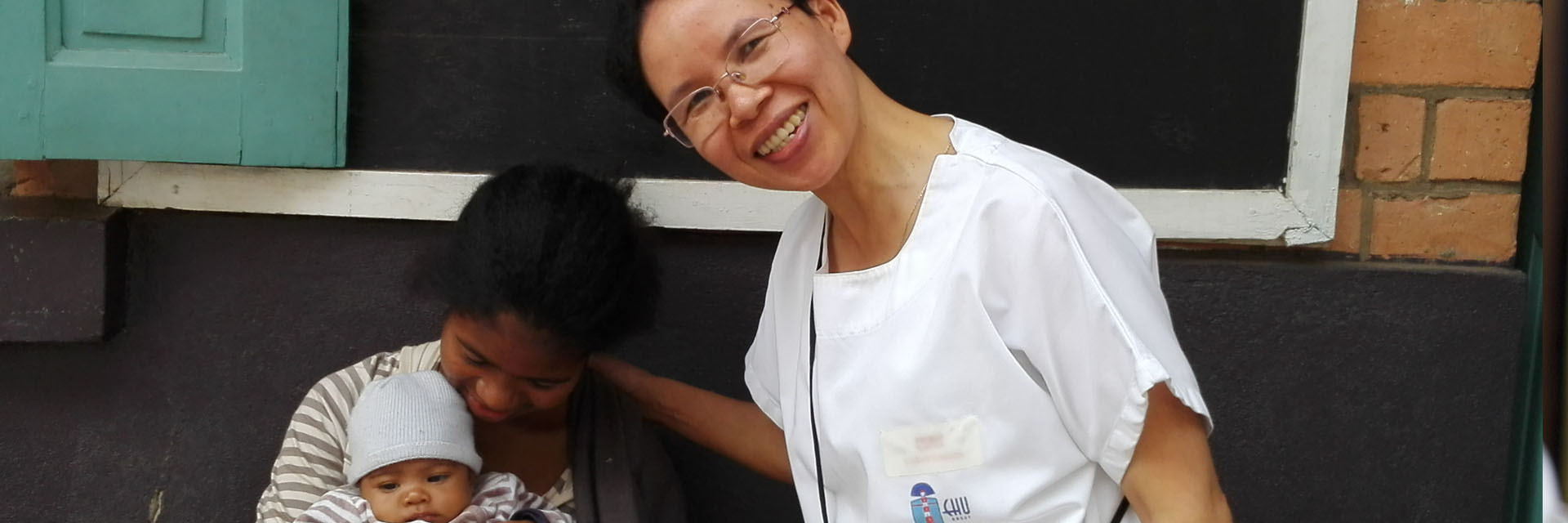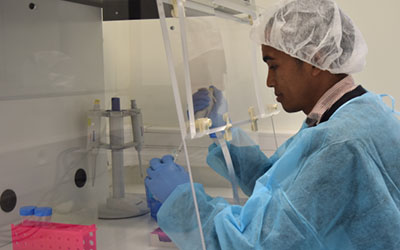Access to diagnosis
RESAMAD
We support the development of the RESAMAD Malagasy network of public hospital laboratories. We have provided a computerized Laboratory Information Management System (LIMS). In 2018, we set up a bacteriology unit in the laboratories of the university hospitals of Tanambao I in Dirégo-Suarez, Anosiala and Ambohimiandra.
EVAMAD
We are also a partner of grassroots activities which promote access to HIV viral load diagnosis and monitoring. With the EVAMAD project, supported by Expertise France, we are working to improve virological care for people living with HIV in Madagascar, by scaling up access to viral loads and contributing to the strengthening of the Malagasy health system in on the long term.
Infectious Disease Detection and Surveillance (IDDS)
We also took part in a project to detect and monitor infectious diseases in Madagascar, initiated and funded by the United States Agency for International Development (USAID).
Enhancing research capabilities
We are involved in several research programs in Madagascar:
- A research program on the occurrence and environmental sources of tropical mycoses (chromoblastomycosis and sporotrichosis) to improve patient care,
- HBV viral load assessment,
- The evaluation of the prevalence of E.coli producing ESBL in humans, the food chain and the environment in Madagascar.
APRECIT
As part of our fight against tuberculosis, we participate in the APRECIT project. Funded by the French Expertise Initiative, APRECIT is conducted in cooperation with the Pasteur Institutes of Madagascar and Cameroon. This operational research project aims to identify the best strategies for screening for latent tuberculosis infection (LTBI) at community level. The results will make it possible to propose recommendations to the National Tuberculosis Control Program to strengthen the management of vulnerable populations.
NOSO-COR
Following the COVID-19 epidemic, we took part in the NOSO-COR project, a prospective non-interventional hospital-based study whose objective is to describe and document cases of COVID-19, nosocomial transmission in hospitals and infection prevention and control practices and policies in hospitals. In Madagascar, this study is implemented at the Charles Mérieux Center for Infectious Disease at Ankatso University in Antananarivo and at the Befelatanana and Anosiala hospitals in Antananarivo.
Support for mothers and children
With Fondation Christophe et Rodolphe Mérieux, we work with several local associations that tackle poverty, including Akamasoa (meaning “good friends”), which provides accommodation, health facilities, schooling and income-producing activities for more than 20,000 people in Antananarivo.
We also contribute to access to medical care via the “ Solidarity Fund for Underprivileged Children and Women ”, which has so far provided medical care for more than 2000 people. A health education program was also established for the most vulnerable families, in partnership with school medical services and child protection associations.
In a context of promoting good hygiene to prevent the spread of infectious diseases, we wish to raise awareness among children, young people and their families about health issues related to their daily lives and encourage them to implement these good practices. We are therefore conducting several training actions in health education in Madagascar in partnership with local actors, in particular associations taking care of street children or children in great social difficulty.
Within this framework, we participate in the development of awareness tools on five health topics, in accordance with the Malagasy national education programs:
- WASH (Water, Sanitation and Hygiene),
- Nutrition,
- Infectious Diseases.
In Madagascar, we are also involved in the fight against malnutrition, in a global health approach. We are thus participating in the installation of a factory for the production of nutritious food for the country’s children.


